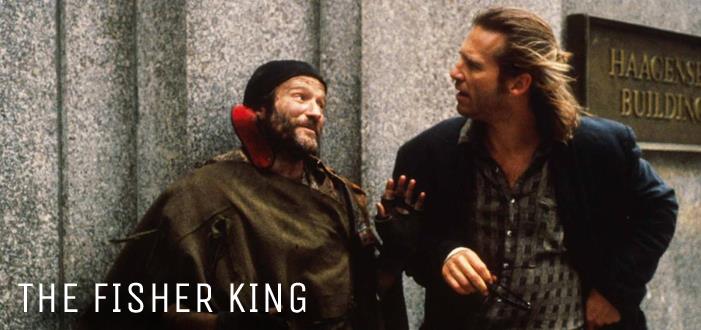
The Fisher King
Redemption. What is it good for? Is it simply a self-indulgence to delude those which are being redeemed? Does it restore order and balance in the universe? Is this the legitimate rationalization by those who have wronged and are now seeking to make it right? That in the big scheme of things, that which extends beyond their limited and petty emotions of self-righteousness, the world has been improved through reversing or overcoming and violable act? Notice the contrast with salvation. Salvation is an externality that causes the world improvement. It is not self-initiated like redemption can be considered, despite both being unified in creating more order, more harmony, in the cosmos.
The Fisher King then is not a story about salvation, but about redemption. And while one can be amused at the picayune degree of redemption exercised in the film, it nevertheless demonstrates a fundamentalism to the human condition and its need to continuously move itself toward betterment; toward perfection. And while this movement is not necessarily a consequence of disharmony, a word which is used in place of immorality, evilness, unethical behavior, etc. the artistic demonstration and investigation of this rectification provides us with a great degree of relief. A great sense of hope even, that, while it is true we are not perfect, we can be made more perfect than what we are.
Of course the film doesn’t explore this aspect overtly. It concerns itself instead with the zany and insanity of psychological dysfunction that results from traumatic experiences to the human psyche. The degree of which creates a spectrum, from those which are lost to functioning within society, and those which function at an unsatisfying level. From beginning to end, The Fisher King has its characters searching for a resolution to this dysfunction beset by the trauma. And this we call redemption.
Clearly, however, the characters do not return to what they were. That is impossible. They have been permanently changed as a result of their shared experience with the tragedy that is always pregnant when chaos and man’s free will coalesce. Redemption, as mentioned before, brings man closer to God. And its sweetness is found with the fact that it is self-determined. It does not call upon a higher power to submit to. It is an act of willful creation, genuinely a will-to-power that actualizes what the characters are supposed to be. Thus the paradox of being human; wrestling with chaos and tragedy brings forth a better mankind.
Grade: B+

